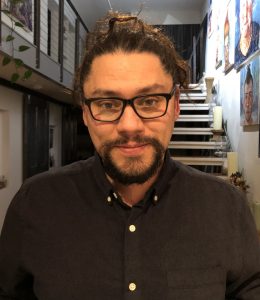
The Harvard Medical School Research Fellowship in Integrative Medicine is a NIH-funded three year joint program of Harvard Medical School-affiliated teaching hospitals. The program accepts postdoctoral candidates including physicians, anthropologists, health behaviorists, sociologists, psychologists and integrative medicine (IM) providers with doctoral degrees who are interested in research training towards academic careers in integrative medicine.
Read below to learn more about Dr. Dennis Muñoz Vergara and what motivates his research at the Osher Center.
What is your area of focus?
I’m interested in translational research; meaning the bridge between basic and clinical sciences, and the bidirectional possibilities it offers me. When working with Dr. Helene Langevin at the Connective Tissue Lab, we employed different animal models to explore the effects of body stretching on the resolution of inflammation. Later, I translated that model using pigs because they resemble human anatomy. I trained pigs in a wheel-barrow paradigm to stretch their lower back under a subcutaneous inflammation model. I recently finished a pilot clinical trial exploring the acute effects of single session yogic-stretching on inflammatory markers and protective lipids. Translational research allows me to go back and forth between bench lab and clinical work to elucidate biological mechanisms of body stretching, a behavior shared by different species, and a pivotal component of mind-body approaches, such as yoga or Tai Chi.
What motivates your work?
Years ago, I encountered the yoga tradition when I was far away from my Atacama Desert people, a native culture that loves to dance and move. In a sense, yoga acknowledges the complexity of the human body as a unit, which is more appealing to me than the reductionist western approach of dismantling the body as if we were machines. This is the conundrum that motivates my research. How do we figure out new paradigms to understand integrative approaches, such as yoga? What knowledge gaps do we need to focus on first to understand the mechanisms employed by mind-body techniques? How can I use translational research to fill those gaps? These questions and more motivate my work.
Where do you see the future of your work in Integrative Medicine over the next 10 years?
This reminds me of a book I’m reading from the philosopher Byung-Chul Han called The Scent of Time: A Philosophical Essay on the Art of Lingering. It is hard for me to see myself in 10 more years without recapitulating the current pandemic events. In the short-term, I’d like to include pain into my research matrix. I’m interested in exploring the intersection between pain, chronic inflammation, and yoga. In the long-term, I see myself using translational research to unveil how yogic stretching and other yoga components might help in mitigating chronic pain/inflammation. I see myself using animal models to inform clinical trial designs and vice versa. For example, we need new self-stretching animal paradigms or new tech gadgets to control for stretching parameters in yoga studies (i.e., duration, frequency, intensity, and posture). The potentials are limitless. We just need to use our imagination in the present moment.
Recent Publications
Dennis Muñoz Vergara, DVM, MSc, PhD, Lisbeth Berrueta, MD, PhD, Colleen Carmody, BS, Xingxing An, PhD, Peter M. Wayne, PhD, Ann Marie Zavacki, PhD, and Helene M. Langevin, MD. Establishment of a Novel Porcine Model to Study the Impact of Active Stretching on a Local Carrageenan-Induced Inflammation. American Journal of Physical Medicine & Rehabilitation, Nov 2020.







